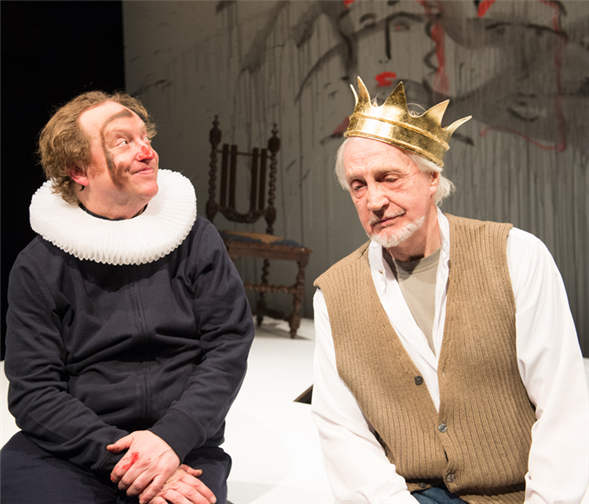Why My Perfect Mind injects comedy into tragedy
---
It's one of the most startling Shakespearean moments in recent memory: Standing in the middle of Theater A at 59E59, celebrated British actor Edward Petherbridge delivers a heart-rending version of King Lear's mad scene, when the monarch rails helplessly against nature as he's pounded by wind and rain. At the same time, the performer and writer Paul Hunter, with a painted red nose and a face smeared with makeup, races around like a slapstick clown, trying to create ominous sound effects by rolling cannonballs across the floor and wobbling a sheet of metal. As Petherbridge builds to his monologue's climax, Hunter gets more and more frantic, hurtling across the stage on his belly, flinging himself from one noisemaker to another like a penguin sliding on a patch of ice.
To put it mildly, it's disorienting to see Petherbridge's aching performance unfold amidst this buffoonery. And it's
also strange to see legitimately funny prop gags contend with a tragic speech.
That dissonance makes
My Perfect Mind a fascinating show. It's not only charming, and it's not only poignant or ridiculous or sad. It's all of those things at once.
This complexity is a hallmark of
Told By An Idiot, the U.K. theatre company that created this production (and that Hunter co-founded in 1993). The troupe loves to juxtapose the comic and the tragic, shoving wordplay and pratfalls next to tenderness and pain.
Asked why those contradictions appeal to him, Hunter points to a scene in Woody Allen's film
Hannah and Her Sisters, when Allen's character recovers from suicidal depression by
watching the Marx Brothers. "I think it's such a brilliant moment not only of laughter, but of the humanity of him realizing he wants to be alive," Hunter says. "I find those moments very inspiring, when comedy can reveal something like that."
Similarly, the tomfoolery during Lear's speech ultimately becomes uplifting.
{Image1}
The scene comes late in the play, after we've already heard the true story of how Petherbridge was supposed to be performing Lear in New Zealand when he suffered a stroke. Though he made a full recovery, he was never able to tackle the role, and when he met Hunter during an ill-fated run of the musical
The Fantasticks, they decided his inability to play Shakespeare's king would make a good show on its own.
By the time we get to the mad scene, Petherbridge and Hunter have essentially become a vaudeville duo, with Hunter playing a variety of silly characters who try to help the older actor tell his story, recover from his medical condition, and finally embody King Lear. They may not be very
good helpers, but they certainly mean well.
Which is largely the point. "When I'm sliding down the stage and creating the storm, my intention is to make it the best
Lear for Edward that I possibly can," Hunter says. "However, my enthusiasm and choices have the opposite effect."
That's where the
Hannah and Her Sisters effect comes from. There's something life-affirming about a bumbling fool's attempt to create the perfect tragedy. It's a reminder that even if you have a stroke or go crazy in the rain, life itself is not turning against you. Things might be chaotic, but they can still be filled with joy.
Laughter also keeps us from pitying Petherbridge's plight. "Edward was the first person to consistently say he didn't want it to be sentimental," Hunter says. "He didn't want the piece to dwell on his stroke in any way. We were conscious from the very beginning that this has to be about human resilience, and within that the humor became crucial right to the very end."
---
Mark Blankenship is the editor of TDF Stages
Photos by Manuel Harlan. Top photo: Paul Hunter (left) and Edward Petherbridge
